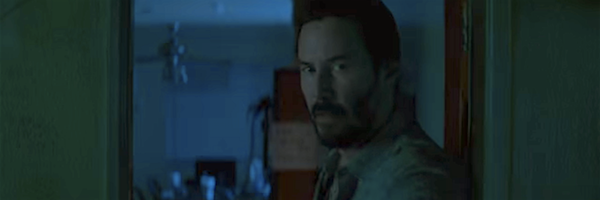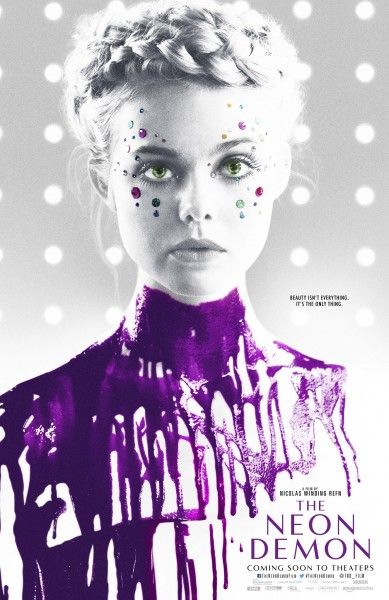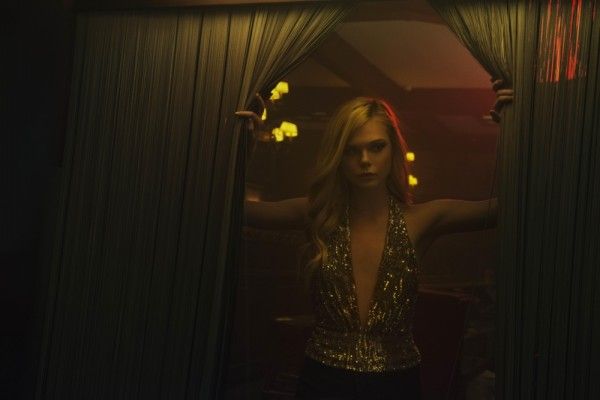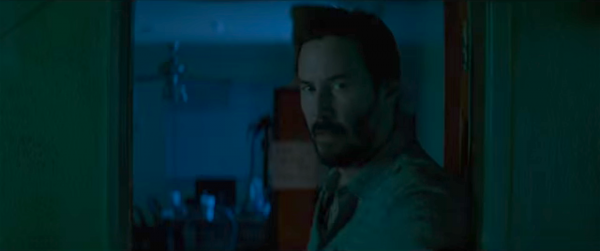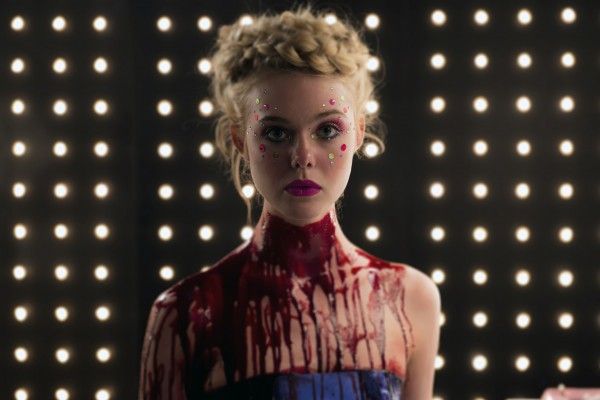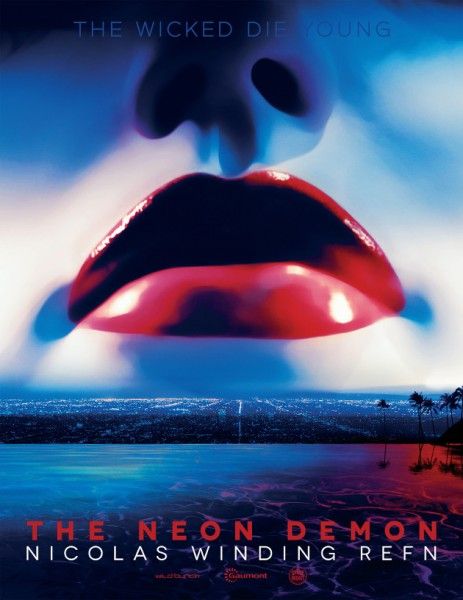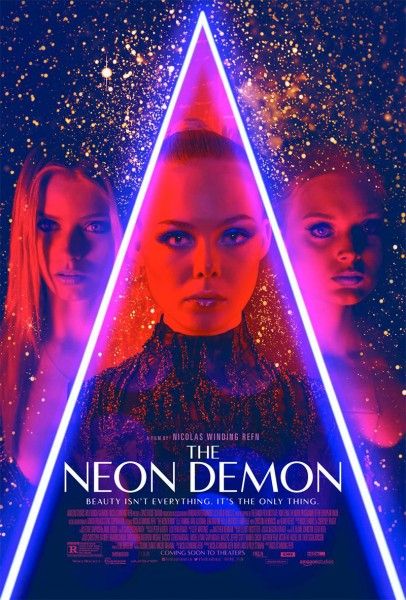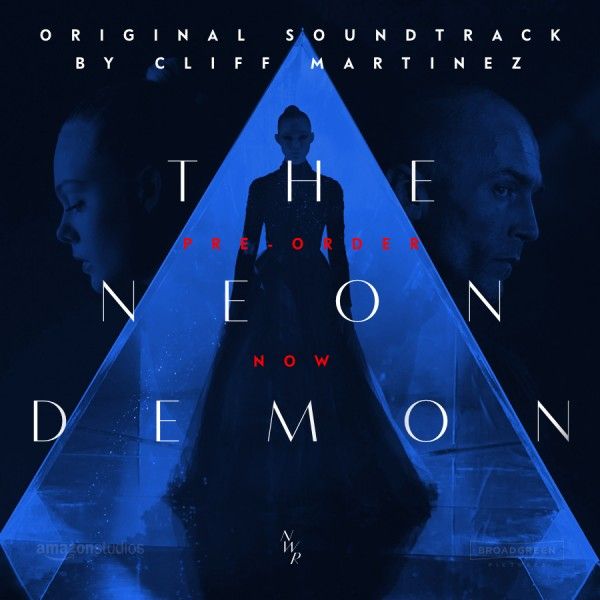Last year, when Nicolas Winding Refn’s The Neon Demon was filming in Pasadena, I got to visit the set with a few other reporters. As I walked on set, all I knew was that Elle Fanning's character was living in a hotel as she tried to launch a modeling career and Keanu Reeves was playing her hotel manager. But like every Nicolas Winding Refn film, I knew no matter what I was told about the story, there would be a lot of surprises.
So during a break in filming when we got to speak with Refn and Reeves we asked a lot of questions about the story, how they came to work together, why he wanted to tell a female-centric story, the scale and scope of the story, if he was describing the film as horror, thriller or supernatural, how things changed a lot on set, and a lot more. If you’re a fan of Nicolas Winding Refn and curious about his process, it’s an interesting conversation.
Before getting to the interview, here’s the official synopsis and you can watch the trailer here. The Neon Demon is in theaters June 24th.
When aspiring model Jesse moves to Los Angeles, her youth and vitality are devoured by a group of beauty-obsessed women who will use any means necessary to get what she has in The Neon Demon, the new horror thriller from Nicolas Winding Refn. The Neon Demon stars Elle Fanning, Jena Malone, Bella Heathcote, Abbey Lee, Karl Glusman, Keanu Reeves, Christina Hendricks, Desmond Harrington, Alessandro Nivola, and Charles Baker.
Question: We were actually just talking about how, in the scene, you had music playing. Can you talk a little bit about how that came about?
Nicolas Winding Refn: Well, it’s sometimes easier to do things with music for the performances, you know? I’ve been using it a lot in the past couple years. So it just helps performance. It also helps visualization and conception as well.
When you’re scripting and coming up with these ideas, do you have the music or the sounds in your head?
REFN: Sometimes. It can be variation. Sometimes it does, sometimes it doesn’t. But I do use music a lot.
Does it ever change on the day?
REFN: Oh, yes. We shot a scene yesterday, me and Elle [Fanning], that changed the whole movie. Like, alright, okay. Reset. And that has happened numerously. That has happened numerously. So, it’s very common. And I like that process, I like not knowing.
Do you have an idea now for what the music will sound like for the soundtrack?
REFN: I’m starting to think that – I tend to like electronic music, so I think this will have the same vibe.
How does your relationship with Natasha [Braier, the cinematographer] come aboard? You’re talking about doing things on the fly.
REFN: It usually starts when I yell out, “I have an idea!” And then she goes, “what?” But she’s actually amazing. I absolutely fucking – I didn’t have a lot of money to make this movie so it was challenging getting a crew to begin with, it’s easy to get people like him [gestures to Keanu Reeves] to get a crew. But once I was able to secure the crew, they’ve been fantastic. And Natasha has been, I mean just… And I thought it was important to have a woman to have so many women to photograph because, you know, most guys would be like ehhh. And a woman is like, “no, no, no.” Women take time and all that: “can we just hurry up?” “No, no, no, no.”
Since you’ve had mainly male protagonists in your films, what made you want to take on a film with a mainly female cast?
REFN: Well, I usually make movies about violent men. And I felt that it was time, I needed to do something different. Especially after Only God Forgives because you know, what’s the one thing that no one would expect? Well, to do a movie with a 16 year old girl. And I like, even though it’s very conceptual, but it’s a bit like setting up an obstacle for one’s self, but taking it as a challenge. I grew up very dyslexic, so I had a lot of difficulty in school. So, and you had to trick a lot of things to be able to learn, or social situations because of the embarrassment of not being able to read and write and so forth. It’s a difficult thing growing up, having dyslexia. So I was always forced to lie basically, about it.
So, what does that have to do with women? [laughs]
REFN: Well, I’ve only had one girlfriend: and I met her when I was 24 –
What does that have to do with choosing a female protagonist?
REFN: It was the one thing I hadn’t done yet. That was the reason, now we know.
So it was an exploration.
REFN: Yes, it was.
You’re exploring.
REFN: I’m exploring the female anatomy.
So, Keanu, are you a violent man in this film as far as you can say?
KEANU REEVES: Um, yes.
What can you tell us about your character?
REEVES: I’m a motel manager. Yeah, so I’m kind of, Elle’s character, Jesse, stays in a motel. And I am the lord – I mean, the manager. So I’m kind of like a witness to a certain section. I’m a gatekeeper, I’m someone to get past. I’m someone who has his own way of doing things. Almost in a weird way, Jesse kind of sharpens herself – her character is revealed by being challenged, I think to a certain extent, by my character.
So it’s not like a mentor/protege relationship.
REEVES: It depends on how deeply you want to take that. If your greatest enemy is your greatest teacher, then I’m probably ninth grade.
[laughs]
REEVES: I’m like a ninth grade boy.
I’m curious if you guys could talk about your first meeting. Sometimes actors and directors, you know, they have that feel each other out period: are you going to work well with each other, are you going to gel. So how did you guys first sit down to talk about the project and what was that initial meeting like?
REFN: Well, we met at my house, because I’m actually neighboring to Keanu’s mother, so I thought that was easy.
REEVES: I knew where you were staying.
REFN: Yes. He found my map. And I had basically sent him the material and everything that came with it and asked him if he wanted to meet. And luckily he did. We had met before, many years ago, in Paris, actually. And you know, it was just like “come on, man. You want to do it?” And he went, “yeah, okay. Alright.”
REEVES: It was a great script. I really enjoyed the script.
REFN: And that was that.
And speaking of that, Keanu, with things like Knock, Knock or The Bad Batch, which is coming up, you’re kind of going into maybe smaller, more dark types of films. Does this fit into those other...
REEVES: I guess I’ve had those opportunities recently. And I’ve always been a fan of Nicolas’ films. The script that he developed I was really excited to do. I guess the throughline is – so yeah, there’s just been some really interesting roles and interesting material. So I’m glad to be here.
I know that you’re known for allowing little to no rehearsal for your actors before you film, is that something that you’re doing for this movie? And if so, how does that –
REFN: Well, I’m shooting chronologically, in chronological order, which drives certain people insane. “Why do I have to spend three months of my life for ‘x’ amount of scenes?” But what it does, is that it allows complete control to morph. Because the film will essentially change radically. I don’t know where it’s going. Yesterday morning I woke up and I was like, “where are we going to end it from there?” And that gives me that freedom. So, it’s not so much a rehearsal, it’s more of a process. It’s very much meeting with actors, that process. Do they get the vibe? Do they see the benefits? Because we get there and we go, “what would you like to do? What do you want to do?”
How do you feel about this process?
REEVES: I’ve really enjoyed it. For me, I don’t know what it’s like for other actors, but for me to be able to meet with the director and have a sense of the whole project, to just talk about tone, speak a bit about the role. And then on the floor, on the day, it’s really creative just to figure out, what are we doing? Experimenting, playing. Nicolas is very collaborative to a certain extent, he’s always the director. Even though he says, “I don’t know, what do you want to do?” There’s discernment and there’s a “yes” and a “no” or an “I don’t like that.” And then also what’s really fun is the questioning. He has a lot of like, “so, what is this? What are you doing?” And there’s always a kind of take but it’s – he shares the take, and you kind of do that. And even though he speaks about having not a lot of means to do it, you don’t feel rushed in terms of, there’s an energy like, “okay, let’s shoot.” But there is a protection for “we can’t fucking shoot until we have some idea of what,” and that’s what’s fun with that. You’re in the moment.
A little more freedom?
REEVES: Um, I don’t know, I mean… Freedom.
REFN: It’s very instinctual in a way. It’s based on very instinctual.
So in terms of casting, you have to find people who you think can actually go along with that, who can be instinctual in the way you need them to be. How do you – ?
REFN: You meet with them and talk with them about the process. It’s one of the first things I say. And there are certain actors who say, “I have other schedules, there are things I can’t work.” And I say, “okay.” Because it’s the one thing I can’t change. It’s more about me in that sense that I like uncertainty, even though it fucking freaks me out. Liv [Corfixen, Refn’s wife] knows a lot about that. But I like fear of what it can essentially lead to because it just keeps you on your toes. Keanu or Elle or whoever, it’s “I don’t know, but okay, good let’s do that, let’s do that.” It’s a bit like painting. There’s a canvas, you walk in and say, “give me red, okay that looks interesting, now blue, okay, mix them, okay, that’s good, alright. Tomorrow we’ll put something else in.” And the film has changed so much from the first scene because it just is an organism in that sense.
Am I right in that each of the rooms of this motel are very different thematically?
REFN: Uh, I haven’t been into any other rooms. I don’t want to. $255 dollars a night, not interested.
I just mean the rooms it takes place in.
REFN: Well, this is only part of the movie. It takes place here, in Silverlake, shot in the valley, I think. Just all around LA.
So Drive was a very commercial film, whereas Only God Forgives was something that would fit in like an art house cinema, where on the scale does Neon Demon fit?
REFN: Well, it’s interesting when you say Drive was a commercial movie because nobody liked it when I made it. And in terms of commerciality, it was some of the movie that I made that was the most profitable and exposure. But there’s no difference, I felt, from what I’d done on my other movies, and later on. It just became very exposed. Which was weird because when I was making it, everyone was like, “oh man, you blew your chance.” There were even people who had their names removed, and then when it premiered they wanted their names back on. Which is fine, you can joke about that, but all my movies are commercial movies. That’s how I’m allowed to make movies, essentially. I don’t rely on subsidies, because it’s hard to get from Europe for the kinds of films I make, so basically I have to rely on the market. And the market dictates what are you worth and they will give you what equals that. And I have been lucky to sustain that. And oddly enough, Only God Forgives made more money than Drive for the financiers, because it was a lot less expensive. So when it got time to make this movie, I said to the French financiers, “I need $5 million dollars. I have no names, I basically just have a script.” And they said, “okay.”
Formidable!
REFN: Oui. If it doesn’t work, that’s – I’m very, I spent a lot of time agonizing about how to make it work. Does that make sense?
In preparing your actors for what this journey was going to be, did you have any reference points like movies, or books? Anything to give them an idea, aside from the script, obviously.
REFN: It’s not even so much about the script because it changes so much. It’s more about the – what did I tell Elle? Oh yeah, I told Elle to watch Beyond the Valley of the Dolls. One of the greatest films ever made, in my opinion.
Was there anything that you watched, in preparation?
REEVES: Beyond the Valley of the Dolls.
From what I understand, Elle’s the main character of the film. So how many days – it’s a 40 day shoot –
REFN: For now.
My bad, I apologize. But how many days?
REEVES: I have five.
You have five days?
REEVES: You shouldn’t even be talking to me, I only have five.
A day player. If you’re filming in chronological, does that mean that all five were in a row, or are you spaced out throughout the shoot?
REFN: He gave me eight weeks of his life. Well, six. Come on, how cool is that?
Have you found, in coming into set with the breaks in between that the film is changing? From your perspective?
REEVES: From what he puts on the page to what you end up doing, maybe text and location and action change, but I haven’t had anything change in the sense of tone or what you’re supposed to do – yet. I’ve got another five hours but…
There’s a twist!
REEVES: Yeah. So for me, it was like sometimes I’ll prepare, a couple times we rehearse in a location, so I’m like, “okay, so this is going to be here.” And then it asks me to like, eat this one food and I’m going to have this or there’s an action here, so I like picture the space and I have this whole thing I’m going to do with the food and I got here and he’s like, “no food, no I don’t think we need that.” So that basically taught me like, be internally ready, have an opinion, work on your character but not necessarily… Don’t fucking make your performance the night before, or come in with that. Which, on certain projects, you can do.
But you feel like a collaborator.
REEVES: Is that what I am? I’m a meat puppet. I’m here to serve. I’m of service. And I feel free.
[laughs] This might be a silly question, but can you talk about what The Neon Demon is? Or what that means?
REFN: There’s a character in the movie that’s “the neon demon.” But I haven’t chosen who yet.
Would you describe this more as a horror film or a thriller or supernatural…?
REFN: It’s everything in one. It’s like really good sex.
I had read for a while that you, and you never know how much of this is actually true, but I’d read that you’d wanted to make a horror film for a while. Is this that movie?
REFN: I don’t really know, good question. I tend to say things, a lot. And then see what happens. It certainly has horror elements, I think. But I think that our understanding of genres are more interested if they’re not what you expect. And so therefore it’s hard to describe anything. Because if you know, there's such a preconceived notion of everything you do. And almost like a hunger for definition. Before you even do it. So, I probably sold it as a horror film. And then you know, but it was like – it’s usually the same routine. You tell your financiers one thing and they’re really excited, and then you go, “something happened.” And then they’re like, “okay.” But then luckily it has worked out.
It is called a horror film, but all the elements of it, like the vanity and the jealousy and the need for fame, are such realistic, universal aspects. What is more important to you to get across to your audience?
REFN: Have a good time, all the time. I’m not a political filmmaker. I don’t have that. I like things that are not – I like a little bit of everything. If that’s good or bad, it’s almost irrelevant to me. I hope it’s good. And I’m sure it will be good for certain people. And certain people will not appreciate it. And that’s great because either way you’ve penetrated their minds.
When you sat down to make this movie, you obviously had an idea, a script, a story, something going on in the brain. Compared to now, how much is that original idea coming through and how much has it been a radical change based on where you are and where you’re filming and what the actors are bringing to the table that day?
REFN: Everything changes. But of course the journey that Elle’s on is very specific. And the alteration of that has been very significant. Which has been beautiful. And I have to be on my toes, to go “okay, now we went that way, but we could have gone that way. So let’s go, see what happens over there, then.” So I may come on and say, “okay, fuck tomorrow we have to do everything completely different.” It might be the same scene, but the subtext is completely different. So it’s like – it constantly evolves. So like, yesterday, we had a scene, and I just said, “I’m going to put the camera here, I’m going to play some music and you see what happens. Just see what happens.” And she did something and I was like, “that’s it, oh my god, okay. Alright that means that la, la, la, la, la, la, la has altered.” So it’s like a domino effect. That leads me to say, “ah, the ending should be different now.” And so forth.
I think of the example of North by Northwest where Hitchcock was so concerned over a phone booth location that he stopped production, do you ever hit something like that?
REFN: I don’t have the money.
[laughs]
REFN: To stop the production. I wish I had! To have five minutes to breathe. And have a coffee with Keanu, but I don’t.
Do you have those moments of panic, of writer’s block?
REFN: Oh, constantly, but you have to get over it. And there are things where you go, “oh, that didn’t turn out to well.” But you gotta smile and say, “that was great, let’s move on!” But in your head you gotta go, “okay, okay, okay, recut that differently when I get back.” No, I would love to do one day with the amount of money where you could just say, “you know what? Fuck it, let’s go back and redo it.” But I also like the concept of just whatever it is, if it comes. If you can’t, you just have to let it go.
Is the character of Hank that you had on paper kind of stayed the same with Keanu or has that changed?
REFN: Of course, absolutely. But for good, for better.
What do you think?
REEVES: I don’t know. He’s fun to play. He has a bit of a bark, but not much bite. But he has a little bit of bite.
REFN: Oh, yeah.
You’ve spent a little bit of time in LA. Were there any places that you wanted to see photographed that had not been photographed that you might have recommended and said, “Hey, we totally have to film…”
REEVES: No, that’s not my place.
How specifically is this Hollywood? In comparison to Los Angeles?
REFN: OH, I love LA. It’s not so much about Hollywood. I love everything in LA. I mean, Liv basically didn’t want to go to Tokyo, right now, where I was going to do this other movie. She said, “I’ll only go to LA.” So I go, “okay, that solves that.”
In addition to your DP, I would love to hear about the screenwriter who helped bring this to life – her perspective and how you found her.
REFN: I found Mary [Laws] because originally I went to the UK with kind of a structure. WIth a start, middle and an end. But since it was going to be about young women, I knew that I would benefit greatly from working with a young woman to write with. Especially because I’ve done a lot of silent movies and women yapping is very alien to me. And in London, I met a lot of wonderful writers and so forth, but I couldn’t find anyone that had what I felt the film needed. But it was very useful because of course you continue to expand on what you want to do. But I didn’t want to go to America because it’s very expensive here and I couldn’t use EU money by hiring European writers, but I couldn’t find anything I wanted to work with in the end, it didn’t really work out. And so I crossed the Atlantic and I went to William Morris and they sent me a thousand samples and I think, “oh my goodness.” I didn’t read one of them because it was so overwhelming. And my agent said, “well, we also represent this young playwright out of Yale.” And I said, “oh, great, a playwright is what I was looking for in the UK and couldn’t find, that suited the movie.” And so I read some of her stuff and she had a good sense for dialogue and we called her up and we had a few meetings over the phone and she was super enthusiastic and willing to give it everything she had. She had never written a script before, which I liked. Because not knowing can be a benefit. So I hired her. That was that.
It’s pretty cool to have all these women, doing this. I mean, for me. As a fan of movies and genre and all those things. To have these kind of untapped female visions and voices, that’s a pretty cool thing.
REFN: We got three women plus Elle, my producing partner is a woman, Rachel [Dik, EP] sits over there, who works on everything I do, is a woman.
His publicist.
REFN: My publicist is a woman. Natasha is a woman, you know. And of course in the end it all leads back to the uber-woman, who is the wife. Who in the end says her strong verdict, what’s right and wrong.
It really sounds to me like this is an experimental movie. If you want to use that term.
REFN: Everything is experimental.
Did you know how experimental it would be when you signed on, and has this been the case with all the movies that you've done, where it’s this much experimentation as you go?
REFN: Absolutely. Anyone, you name them. Bronson was like, “I’ll do a movie about my own life.” And it became like an experiment. Valhalla Rising, I saw a Viking movie with Mads Mikkelsen, and had great action but I wanted to a science fiction movie because I can’t stand Vikings, they’re so stupid. But I loved the concept of it. So I wanted to make a science fiction movie. Drive was just me and Ryan having our little homoerotic love affair that lead to some kind of, “let’s do this.” But as you go along, like the elevator scene that was three weeks into shooting. I said, “you know what, I think I’m going to shoot this instead of something else.” So everything is always an experiment.
Did you know how much of an experiment it would be?
REEVES: No, I’d only seen the construction. In terms of the film, kinda seen behind what it meant to make that. Just through meetings with Nicolas. And then just going to how we shoot, so I didn’t know anything except the construction. But having enjoyed the work so much, you’re willing to give to him. It makes you say yes.
Somebody else asked me why he wears the blanket. They’re asking me about the blanket.
REFN: Ah, the “power blanket.” The “power blanket” is a must-have for every movie. I use it to wrap around my stomach, and it contains all the energy and calmness within it, like a genie in a bottle. And it’s usually – I used to take a piece of fabric from a costume but now it’s becoming like a ritualistic thing and I get it in different colors and designs and so forth. But I had a very weird incident a few days ago and Musso and Frank’s that I went to see because we had to see the morning locations and I came ten minutes late from dropping my daughter off at school. And there was a guy lying in the parking lot, bleeding from a stab wound in the chest. And another man was holding on, putting pressure on it. It was really weird because the man had no shoes on, but white socks and a tie. And this man who was bleeding, there was no one else there. And I got out of the car, and went over and said, “do you need any help?” And he said, “they already called 911, but they need something to hold the blood in.” And so I gave him my blanket, it was the only thing I had. I didn’t think my shirt was going to work. So I gave him my blanket. And then the guy died. So that was pretty weird.
He died right there?
REFN: Yeah, right in front of me. And then it became a homicide. So then I was locked in and I had to go shoot. And I wasn’t like, if we didn’t make the day I wasn’t going to get it back. So they were able to get me out, the police, through Musso and Frank’s, to the set. But as I was waiting to go, and seeing them covering his dead body now, they took my blanket away. And I felt the urge to hear “Homicide” by 999. Which used to be one of my favorite songs. And listening to that in that moment gave me a whole perspective on how I was going to shoot the rest of the day.
That’s a pretty crazy story.
REFN: And then my wife came out with another blanket later in the day, so it’s now red and not blue.
You kinda got a Captain America thing going.
REFN: Yes we can, as Obama says.
Do you take that as an omen of any sort?
REFN: I tried, it didn’t work out, but god gave me a great inspiration.
Thank you for your time.

